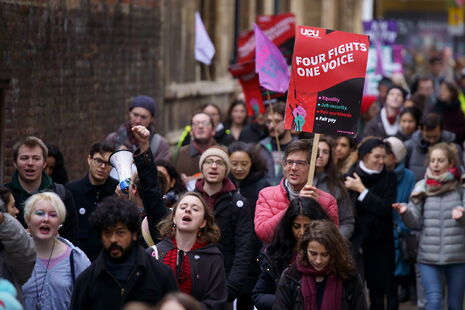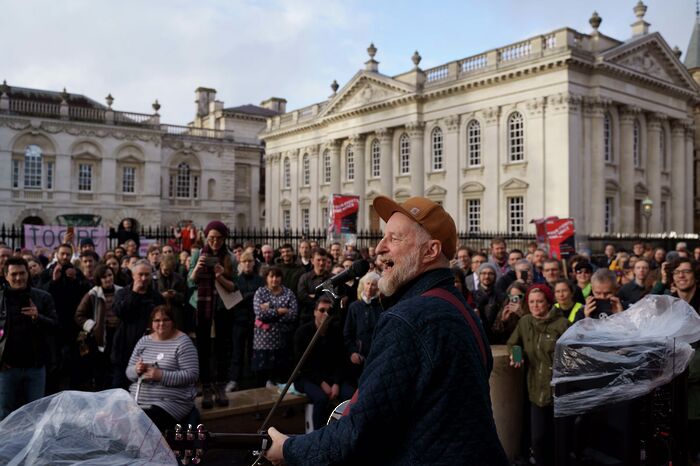Perspectives from the picket lines
As strikes began, Varsity spoke to picketers around Cambridge about why they’re joining the industrial action

This week, University staff and students have gathered on picket lines around all the major lecture sites in Cambridge in support of the UCU strike, which will run until the 4th of December in 60 universities nationwide.
At Sidgwick Site, picketers gathered round a brazier as woodsmoke rose high into the air of West Road. A group of students and lecturers learnt songs outside the Faculty of Music, accompanied by an outdoor discussion and reenactment of Pauline Oliveros’ ‘Sonic Meditations’.
With the support of the likes of Ai WeiWei and Billy Bragg, the daily pickets and rallies have attracted much attention. Varsity approached picketers to see how they feel about the strikes.
Many of the picketers expressed their frustration at the University’s neglect of staff welfare. A University teaching officer from the Faculty of Classics said that “wages have been falling, workloads have been rising, we have a gender pay gap which is particularly meaningful - it’s 19.6% when the average is 12%, which is appalling. There has been almost no action from the administration...the university sector has completely refused to stick up for its employees.”
A lecturer from the History Faculty said that “to sum it up, universities across the country have not been putting money into their staff, even though they’ve been making quite a lot of money, and this is affecting the quality not only of our workloads but also of the education that we give to our students.”
A group of PhD students at Sidgwick told Varsity that their jobs are “extremely unstable”.
“You are just offered a job via email. You’re only paid for the hours that you teach, and that’s all left unsaid,” they said. “We pick what courses we’d like to teach on, but then it’s not clear how the process goes through to the point where you get an email asking you to teach.”
Even more upsetting is the fact that Colleges acknowledge their underpayment of PhD students. “It was really striking to us on our training as graduate students on ‘how to supervise’ that we were told that it’s obviously evident that what we’re paid is not a fair compensation for what we do, and that we should just take it as a token of the department’s gratitude.”
However, the strikers seemed positive about attendance at the pickets. A lecturer said that “there seems to be a lot of support from students and the pickets are really active, so it seems to be going pretty well so far.”
The teaching officer agreed: ‘we’ve had a pretty good turn out from both staff and students, and there seems to be a lot of collaborative action with people realising that our interests are very much the same in that we’re all trying to work for an education system that operates for everybody’.
PhD students made up a large proportion of the picketers, with one suggesting that ‘it would be good to see a lot more staff out supporting. It’s been a common complaint across Sidgwick that it’s mostly Grad. Students striking when really the focus of the strike should be on the staff’.
When asked what they would say to students who feel they are disadvantaged financially and educationally by the strikes, the teaching officer responded that ‘we do this with considerable reluctance. We have tried really, really hard to have serious negotiations’.
‘The Union has been very clear about their position’, they said. ‘The Vice Chancellor said that people should be paid more but then doesn’t do anything about it, so what are you meant to do?... You have to take a stand at a certain point’.
PhD students responded that seeing teaching time in financial terms is a ‘short-term way of looking at it. What will really disadvantage students in the long-term is the fact that their lecturers don’t have fair working conditions. Their working conditions are their teaching conditions. There’s no way they can receive a good education when people are constantly worried about being insecure financially, their mental health is suffering and they don’t know whether their future is secure’.
A member of staff from the History Department argued that students shouldn’t blame financial losses on staff: ‘it wasn’t our decision to charge you this amount of money. I don’t think that you should be paying this amount of money in the first place’.
Another member of the History department commented that ‘when the fees were brought in it was because Government withdrew from funding University. It was a sign of the general marketisation of the sector. I completely sympathise (with students who feel disadvantaged) but that anger should not be directed towards us’.
‘Turn your anger towards something else’, they said. ‘Write to the Vice Chancellor, write to the University administration wherever you are in this country. If staff aren’t paid properly then you’re not going to get a good education. We want you to be taught by lecturers who are doing their best work and who are a properly diverse set of people. The picket is a classroom. Don’t cross it, join it’.
 News / Judge Business School advisor resigns over Epstein and Andrew links18 February 2026
News / Judge Business School advisor resigns over Epstein and Andrew links18 February 2026 News / Gov grants £36m to Cambridge supercomputer17 February 2026
News / Gov grants £36m to Cambridge supercomputer17 February 2026 News / Hundreds of Cambridge academics demand vote on fate of vet course20 February 2026
News / Hundreds of Cambridge academics demand vote on fate of vet course20 February 2026 News / CUCA members attend Reform rally in London20 February 2026
News / CUCA members attend Reform rally in London20 February 2026 News / Union speakers condemn ‘hateful’ Katie Hopkins speech14 February 2026
News / Union speakers condemn ‘hateful’ Katie Hopkins speech14 February 2026










